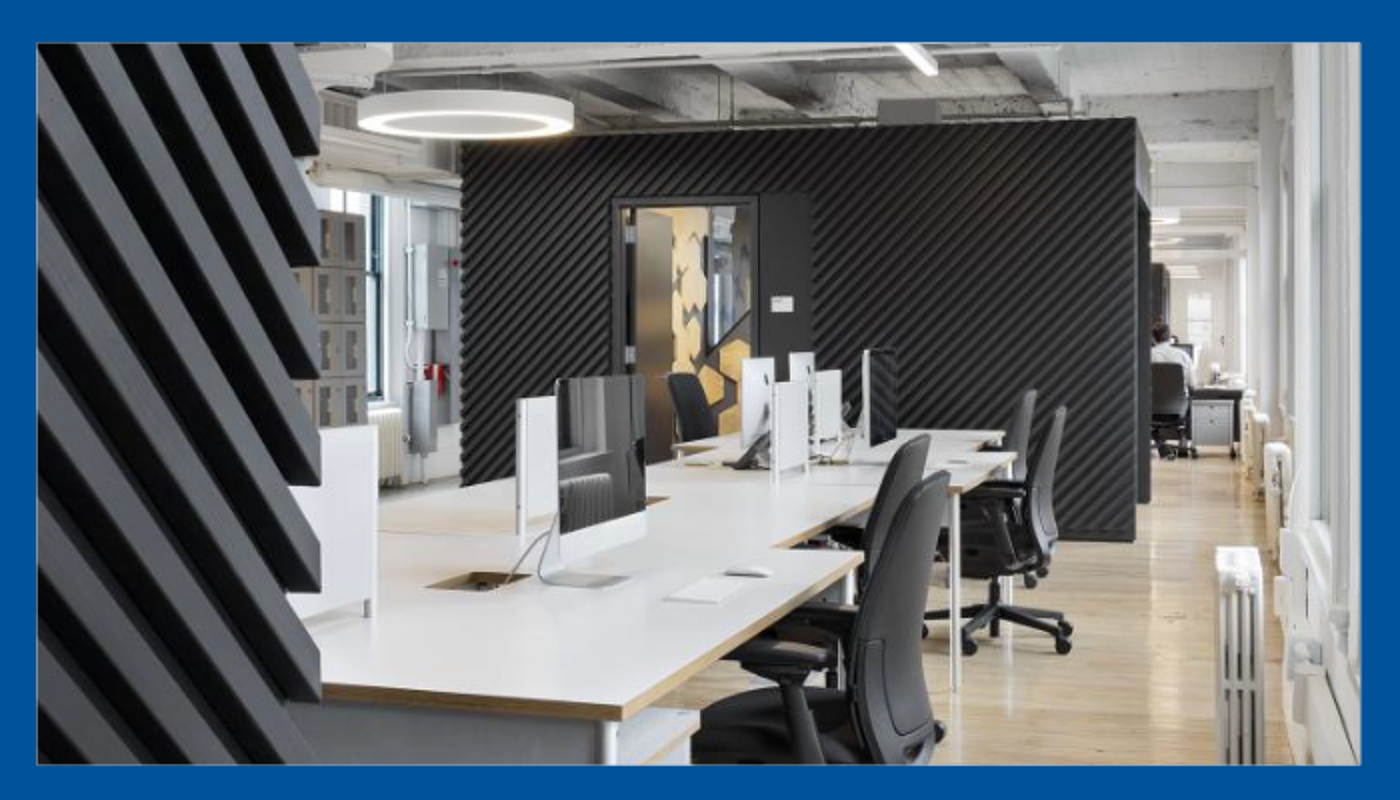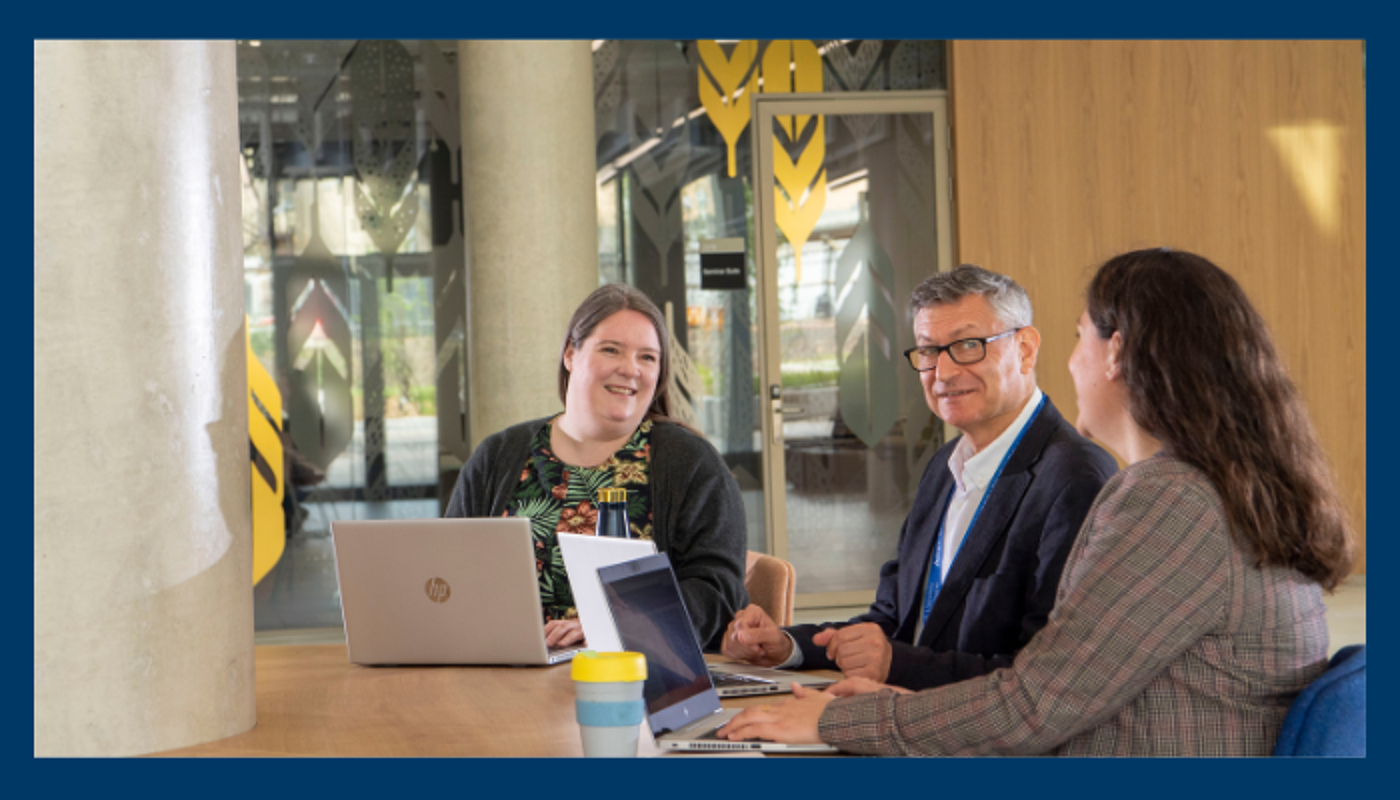People First: Enabling New Ways of Working
 Our response to the pandemic has shown what we can achieve when we work collectively and imaginatively across our University community. We have embraced new technologies; we have worked flexibly and collaboratively; we have remained collegial and supportive; and our progressively strong emphasis on sustainability and equity continue to demonstrate our commitment to our colleague and student communities and society at large.
Our response to the pandemic has shown what we can achieve when we work collectively and imaginatively across our University community. We have embraced new technologies; we have worked flexibly and collaboratively; we have remained collegial and supportive; and our progressively strong emphasis on sustainability and equity continue to demonstrate our commitment to our colleague and student communities and society at large.
The time is right for us to build upon these achievements and take these new ways of working forward.
Our plans align fully with the University Values, as we seek to build infrastructure to support the pursuit of excellence, embrace new thinking and innovative ways of working, trust colleagues across the University to develop new ways of working, and promote and enable a diverse and inclusive community.
What we want to do
We want to bring the benefits of new ways of working to all: to empower colleagues, address critical space needs, increase diversity and inclusivity, enable new technologies, reduce our carbon footprint, and ensure a more equitable working environment. At the same time, we want to re-establish our campus community, and make the University a vibrant, welcoming, and sociable place once again. This is a tall order, and we are mindful of the challenges and obstacles that we must overcome. But we are convinced that together our University community is up the task.
What we are doing
The campus redevelopment is creating new space for our world class research and teaching whilst putting civic engagement at the heart of the campus. There are, in parallel, pilot ventures across the University focused on making space available for collaboration, enhancing hybrid and flexible working, and supporting post-graduate students and early career colleagues. We are driven by the need to create a more equitable and sustainable environment, where space is utilised according to need rather than seniority. At the same time, the monumental task of ensuring that our technology meets our needs has begun, and we will continue to make significant investment in improving our technological provision in a way that makes access to digital systems seamless and ubiquitous.
How everyone can be involved in collective decision-making
Creating a fair and equitable environment which is vibrant and welcoming for colleagues, students and society requires collective input. We would like everyone to be involved in open conversations on how we utilise our current space, how we might use our estate to establish a sense of community and promote collaboration, how we overcome some of the inequalities in our working practices, and how we equip colleagues and students with the tools to work in ways that balance their own preferences with the requirements of the University.
We would like everyone to be involved in open conversations on our ways of working and how we utilise our current space. All areas are encouraged to have ‘blank slate’ conversations about how space and technology are to be utilised, with units asked to re-imagine using their buildings as if they were entering them for the first time. We are encouraging colleagues to approach this exercise with an open mind, encouraging creative options from all.
Strategic Planning Review Cycle
The strategic planning review cycle is the ideal opportunity to start these "blank slate" conversations.
Strategic Planning Reports provide units with the opportunity to reflect and comment on Key Performance Indicators (KPIs) as defined in World Changers Together Strategy 2025, as well as the unit's financial performance, development activities, key events and risks. In addition to this reflective component, the Strategic Planning Report captures the unit's medium to long term vision with key objectives to be accomplished within 5 years as well as objectives intended to be accomplished within the coming year.
To embed discussion about our ways of working including space and technology, the Strategic Planning Reports in Autumn 2022 will include a ENWoW plan.
Resources to help you plan those conversations
Blank slate conversations should take the time to explore multiple options, which ultimately reach a set of outcomes which form part of the SPR submission.
These questions may help to frame the discussions:
- How might we use our estate to establish a sense of community and promote collaboration?
- How can we overcome some of the inequalities in our working practices?
- How can we equip colleagues and students with the tools to work in ways that balance their own preferences with the requirements of the University?
We also understand that to move from blank slate options to actions, guidance on what is possible including space usage, configuration options, and technology, would be useful.
In the sections below you will find resources to prepare for New Ways of Working, including space and technology guidance, case studies, and illustrations.

Technology to support new ways of working
The University is investing significantly to improve device choice for colleagues, the management of devices, and the wifi and IT infrastructure through three key projects:
- Network Programme (NP) - An improvement and modernisation programme for the University data networks to more seamlessly provide connectivity
- Project EOS – end to end life cycle for user devices from procurement to disposal, for both Mac and PC using self service.
- Infrastructure as a Service (IaaS) - An improvement and modernisation programme for its data centre facilities to renew the infrastructure, relocate to modern hosting locations and leverage the public cloud
Information Services End User Computing Team also offer a consultation service for anyone considering the adoption of new IT provision and welcome you to contact them to discuss any aspect of the change.
These resources are to support you in planning for new ways of working and is not intended as the sole information resource available – End User Computing colleagues are happy to discuss any aspect of your transition, and any impact this might have on your IT before you make any decisions.
- Contact us to discuss your needs
- A Guide for planning your IT transition to hybrid ways of working
- Device Catalogue for Desktop and Meeting spaces
- Softphone - bring your desktop telephone number whereever you are working
- IT Frequently Asked Questions
- Glasgow Anywhere

Workspace Futures 2030
Workspace Futures 2030 is a new programme aiming to reimagine our work environments to promote innovative and effective ways of working. This initiative builds upon the foundation laid by the New Ways of Working Group in the space area. By aligning our physical infrastructure with the University's strategic vision, we are determined to create spaces that embody the spirit of our world-changing institution.

Hybrid Working
Hybrid working is the ability to vary place of work, most commonly it is a mix of working on campus and at home. Here we share our Hybrid Working Portal with guidance and good practice to support you in adapting to Hybrid Working in your area.

Modern Ways of Working
Information from our Transformation team on the latest working practices designed to simplify and improve the delivery of change and projects on both a small and large scale.
New Ways of Working News

Workspace Futures 2030 Initiative to Transform Work

UofG Network Programme
Frank Coton explains the scale of the network improvement project - 24 May 2023

We're listening to your feedback on hybrid working
Previous news articles
- UofG Network Improvement Programme - 31 March 2023
- Booking desks and rooms in the ARC - 19 January 2022
- Enabling new ways of working - manifesto for change - 26 September 2022
- Technology supporting new ways of working - 15 August 2022
- New Ways of Working Update - 20 June 2022
- ARC Access for Colleagues - 24 May 2022
Is hybrid working the same as flexible working?
Hybrid working is a form of flexible working where individuals vary their place of work (usually with prior agreement). It may be combined with other forms of flexible working (e.g. colleagues may work part-time, in a hybrid manner where some days are worked on campus and some are worked at another location).
Are there any plans to change the available IT equipment?
The university’s intention is to move from the current environment where many staff work from multiple devices (desktop, laptop, mobile device) with different applications on different devices in different locations, to a more secure, consistent approach where staff have one device which enables them to access all the applications they require from that device.
This will require discussion around how we procure and deploy devices in future and it is likely that this new environment will be introduced over time through the replacement lifecycle, replacing Desktop PCs with laptops and docking stations, where appropriate.
It is also acknowledged that the design of space and use of technology are interdependent.
Can I be compelled to adopt hybrid working?
It is recognised that individuals have a range of preferences and working styles and nobody should feel compelled to adopt hybrid working if it is not for them. Individuals should discuss any preferences (or concerns) that they have with their line manager.
Will the university pay a 'homeworking allowance' for equipment, furniture, utility bills etc.?
No homeworking or equivalent allowance is available due to the non-contractual nature of hybrid working. Colleagues should discuss any equipment requirements with their line manager and an appropriate on campus workstation should always be available if required.
Can I work 100% remotely?
The University recognises the benefits gained from the interactions between colleagues and their workplaces/campuses and the role that colleagues play in enhancing the overall campus experience for our entire community. It has therefore set out an expectation that colleagues on hybrid working will spend some time on campus each week.
Where can I find further support regarding IT and tools to support hybrid working?
The Glasgow Anywhere pages contain a range of information and support in relation to IT tools and resources.
About the Enabling New Ways of Working Group
The aims of this project are:
- to reach agreement with the University community on the most appropriate approach(es) to hybrid, agile and flexible working and how best these might be implemented across the University, and
- to provide enabling policy, technology and space related frameworks in implementing and embedding these new ways of working.

Working Group Members
- Christine Barr: Executive Director of People & Organisational Development - *Lead project sponsor
- Prof. Michael Brady: Head of School of Humanities - *People theme Sponsor
- Billy Howie: Head of Operations, College of Social Sciences - *Space theme sponsor
- Peter Mitchell; Assistant Director, End User Computing - *Technology theme sponsor
- Prof. Chris Pearce: Vice Principal Research
- Prof. Moira Fischbacher-Smith: Vice Principal Learning & Teaching
- Prof. Jill Pell: Director of Institute of Health & Wellbeing
- Prof. Margery McMahon: Head of School of Education
- Ian Campbell: Executive Director of Estates
- Susan Ashworth: Executive Director of Information Services
- Mark Johnston: Director of IT Services
- Sarah Quinn: Director of Programme Delivery
- Linsay Gilchrist: People & OD Communications & Engagement Lead
Enabling New Ways of Working Design Principles
- Develop hybrid working approaches that enable the University to deliver on our core purpose and strategic objectives of developing our community at home and abroad, connecting the community together, and discovering solutions to the world’s grand challenges.
- Be people-led. You understand how we can organise work, and how our spaces should be configured and used. We will listen and respond to great ideas.
- Be open-minded. We must continue to recognise that the ways we have operated in the past may not be the best way of operating in the future. We will experiment, recognising that will make the occasional mistake. We will learn quickly what is, and is not, appropriate for the University and adapt appropriately.
- Develop inclusive ways of working, recognising that aspects of hybrid working impact differentially on individuals and their circumstances. Ways of working will be able to be personalised to respond to where colleagues are most productive and will recognise that a single way of working is not appropriate for all tasks or teams.
- Give choice to staff in how they split their time between campus and other places of work where possible and in a way that allows delivery of work commitments.
- Focus on outcomes of work and away from monitoring hours worked – or a presenteeism culture.
- Develop guidance to help staff and their managers understand clearly what is, and is not, allowable within a broad framework.
- Develop leadership capacity to consistently and authentically implement hybrid working across the University in a way that appropriately balances the desires of the individual with the needs of the team to deliver the task.
- Prioritise the development of a culture that promotes the health, safety and wellbeing of staff. We recognise that hybrid working will create a range of concerns that will vary between individuals. We will endeavour to mitigate these concerns.
- Ensure that sufficient resources are allocated to the roll out of hybrid working environments to enable any pilots to be implemented properly.
Further Information
If you would like to get involved in People First: Enabling New Ways of Working by being a pilot area, have a story on how you have implemented new ways of working in your area, or have further questions/feedback about the initiative, please email:

